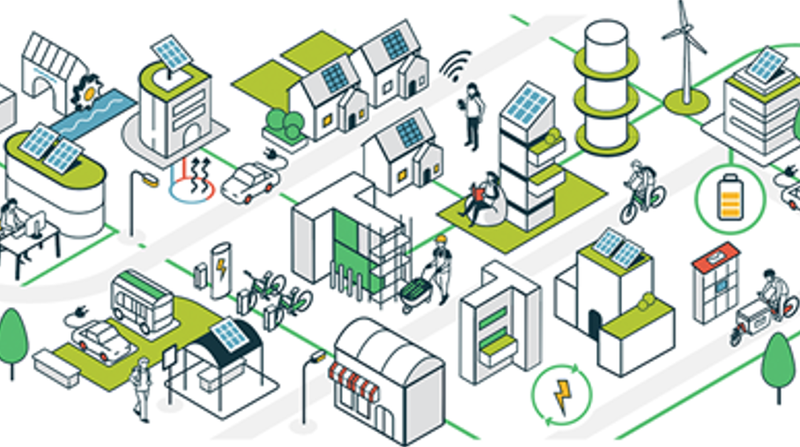Driving Urban Transitions
Driving Urban Transitions (DUT) is an EU innovation program driving urban towards sustainability. Challenges such as climate neutrality and energy transition are centralized in the innovation program.
Centre of Expertise Mission Zero

EDUPED: Educational campuses as the Drivers for Positive Energy Districts
For the transition to a sustainable and future-proof built environment, in which educational institutions are important in achieving the EU's 2050 climate goals, educational buildings and campuses are committed to developing Positive Energy Districts (PEDs). EDUPED's main goal is to accelerate this transition by systematically using urban morphological approaches to renovate buildings, neighborhoods and energy infrastructure.
In the EDUPED project, we co-create PED strategies in five living labs in the Netherlands, Spain, Italy, Austria and Romania. These five campuses locations have been selected based on their high potential to integrate various sustainable perspectives. EDUPED takes a research-oriented approach to achieve tangible and scalable results, combining technical solutions, socio-economic frameworks and managerial and regulatory considerations to:
- Minimize energy consumption (kWh) through sustainable building and campus renovations;
- Optimize the local potential of renewable energy sources and flexibility through smart multi- commodity grids, herein integrated infrastructures that manage and distribute multiple energy carriers (such as electricity, heat, cold, hydrogen, etc.) simultaneously.
- Reduce the effects of climate change on higher cooling and heating requirements. entres and characterized by a diversity of buildings, realize PED principles. This requires a multidisciplinary
Educational institutions, often located in urban functions and users, offer unique opportunities and integrated approach that brings together energy transition, circularity and innovation.
Objectives research
| Main aim | Research to accelerate the transition to PEDs in urban areas by leveraging on educational campuses as living labs |
| Specific objectives | 1. PED refurbishment and regeneration strategies based on urban morphologies |
| 2. Orchestration of co-creation processes with PED stakeholders | |
| 3. Reducing energy consumption through deep retrofitting at district level | |
| 4. Mitigating climate-change effects on extra energy demands | |
| 5. Maximizing local Renewable Energy Sources (RES) and smart multi-commodity grids | |
| 6. Disseminating, valorizing, and exploiting knowhow through DUT Knowledge Hub |
Final product/intended results
- Transforming educational institutions into frontrunners in energy transition and circular economy;
- Increased production and use of renewable energy sources within urban areas;
- Reduction of energy consumption and carbon emissions through integration of more efficient systems and behavioral change on the campuses;
- Practical examples of PEDs that can serve as blueprints for other urban areas;
- A new generation of students, teachers partners and professionals trained in realizing PEDs, with a focus on technical, social and economic aspects.
EDUPED not only prepares educational institutions for a sustainable and circular future, but also actively contributes to creating resilient and carbon-neutral built environments.
Project management
Professor dr Rizal Sebastian and project leader ir Martijn Kruijsse.
Researchers involved
- Prof. dr. Rizal Sebastian
- Prof. dr.ir.ing. Sander Mertens
- Ing. Noelle Choong
- Ing. Britta Hollebeek
- Dean Shenhav
- Dr. Baldiri Salcedo Rahola
- Ing. Pepijn van Willenburg
Project start and end date
15 December 2024 to 14 December 2027.
Programmes, faculties and/or minors involved
- The Hague University of Applied Sciences (THUAS)
- Research group Future Urban Systems
- Knowledge centre Mission Zero
- Research group Energy in Transition
Funding
European Union.
Partners
Project Partner 2 (P2) - Politecnico Di Torino (Italy)
Project Partner 3 (P3) - Universitat Politecnica De Catalunya (Spain)
Project Partner 4 (P4) – Universitatea Tehnica Cluj-Napoca (Romania)
Project Partner 5 (P5) – Technische Universitaet Graz (Austria)
Project Partner 6 (P6) - Asociatia Romania Green Building Council (Romania)
Project Partner 7 (P7) – Dilt Analytics GMBH (Austria)
Project Partner 8 (P8) – Municipality of The Hague
Project Partner 9 (P9) - Associazione Urban Lab (Italy)
Project Partner 10 (P10) – Ajuntament De Terrassa (Spain)
Project Partner 11 (P11) – Municipiul Cluj-Napoca (Romania)
Project Partner 12 (P12) – Stadt Graz (Austria)
Keywords
- EU research
- Driving Urban Transitions (DUT)
- Energy transition
- Educational institution
- Co-creation
- Climate adaptation
- Smart grid
More information
Want to know more? Check out EDUPED: EDUcational campuses as the drivers for Positive Energy Districts.